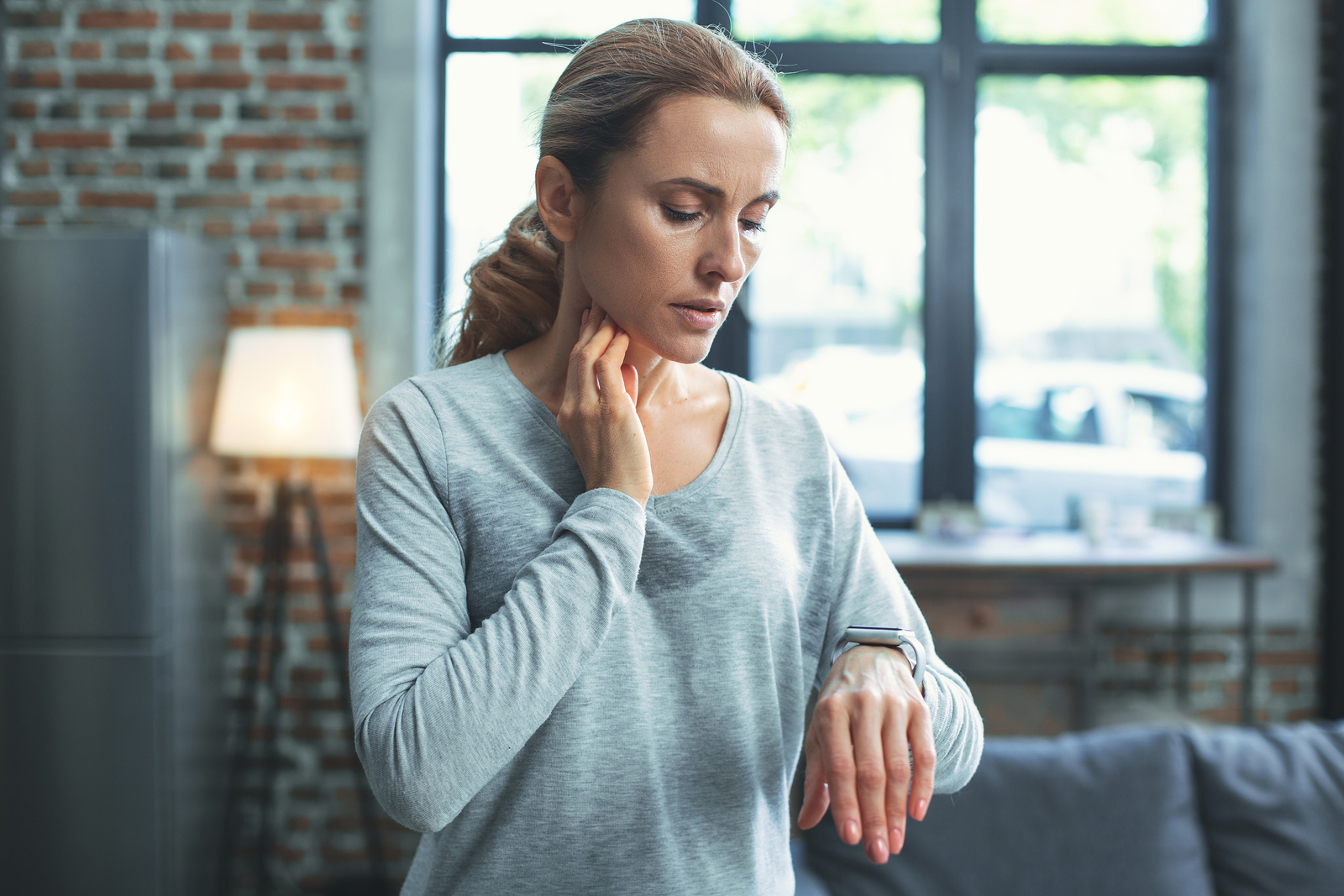My weight has increased since the menopause, what can I do?
I eat healthily, exercise regularly, and swim twice a week but have still managed to gain weight since the menopause, especially around my middle. Is it normal to feel anxious and have palpitations too?
Menopause usually starts around 45 to 55 years for most women. It is said to have officially started once you have not had a monthly menstrual period for 12 months.
Typically the first symptoms of menopause are infrequent periods, changes to flow or periods stopping altogether. These are triggered when the ovaries stop making normal levels of hormones, particularly oestrogen.
For some women, menopause can happen before the age of 40. This may be absolutely normal or could be as a side effect of certain treatments such as surgery, cancer or other conditions such as Down’s syndrome.
Everyone is different but most women will experience some symptoms around the menopause. These can vary but here are some of the most common:
- You may feel sudden feelings of heat, usually in the face or upper body – these are generally called hot flushes
- You may have hot flushes at night – known as night sweats
- Your heartbeats may suddenly become more noticeable (palpitations)
- There may be some vaginal dryness making sex uncomfortable
- Your sex drive could change (libido)
- You may feel anxious or low
- You may have problems concentrating or remembering things
- Headaches can be more common
- You may suffer from recurring UTI’s (urinary tract infections)
- You may find difficulties with sleeping
- Your joints may feel stiff
- You may suffer some muscle loss
- There could be an increased risk of developing weak bones (osteoporosis)
Symptoms such as these usually start months or years before your periods stop and may last for some time afterwards. On average, symptoms stop around four years after menopause but it can be longer for some women.
Gaining weight during menopause
Unfortunately, it is all too easy to put on weight during the menopause and typically this is around the waist. Caused by a change in the balance of androgens (male-type hormones) and a lack of progesterone and oestrogen in the body this may result in an increase in abdominal fat.
It is therefore so important to try and maintain a healthy weight during the menopause. Eat a healthy, balanced diet and exercise regularly. This will not only help with excessive weight gain but will also play a part in boosting your mood.
Treatment for symptoms
Visit your GP if your symptoms are too hard to cope with. A blood test may be taken to confirm menopause. Especially a good idea if you are under the average menopausal age.
Hormone replacement therapy (HRT) is one option that is available to you. This is where oestrogen is taken to ease your symptoms and is available as skin patches, tablets, implants or a gel. Read more about this in Ask The Expert. This is a very effective way to manage your symptoms but it does come with some risks.
Other ways to help you cope:
- Try to keep cool by opening windows or using a fan, especially at night and wear light clothing. Sleeping well will stop you feeling irritable during the day and may help with your mood swings. A cold drink or cool shower may also help.
- Avoiding alcohol, spicy foods, giving up smoking and drinking less caffeine should all help with hot flushes and night sweats. Taking calcium or vitamin D supplements may also help delay developing osteoporosis
- Taking regular exercise is good for your mental health and can help with anxiety or low mood. Weight-bearing exercises such as yoga and resistance types of exercises are good for preventing osteoporosis. In addition, exercise can maintain a healthy weight which may also help with hot flushes and night sweats.
- A talking therapy called ‘cognitive behavioural therapy’ can help with low mood. Anti-depressants are another alternative but these can have side effects. If you are feeling very low then you must visit your GP. Low oestrogen can affect mood and so for some women, a short course of HRT to address the oestrogen imbalance may be all that’s needed.
- HRT can also help with the loss of libido. See you GP if you wish to go down this route as you may be prescribed testosterone as an alternative, however, this can come with side effects such as unwanted hair and acne.
- Vaginal dryness and discomfort during sex can be alleviated with creams, pessaries or a vaginal ring (and can be used alongside HRT). You can also get over the counter lubricants and moisturisers which may help.
Complementary and alternative therapies
You may find a number of complementary and alternative treatments such as herbal remedies or ‘natural’ hormones such as soya-based products like black cohosh and red clover which have a mild oestrogenic-like action aimed to reduce menopausal symptoms. However, these are not recommended by the NHS for symptoms of the menopause as its generally unclear how effective and safe they are.
You can read more here:
How hormones affect mood swings
Disclaimer
All content on Silversurfers.com is provided for general information only, and should not be treated at all as a substitute for the medical advice of your own doctor or any other health care professional. Silversurfers will not be responsible or liable for any diagnosis made by a user based on the content on www.silversurfers.com and we are also not liable for the content of any external websites or links from or to Silversurfers to any other websites. Please always consult your own doctor if you’re in any way concerned about any aspect of your health.
Melina - Assistant Editor
Latest posts by Melina - Assistant Editor (see all)
- Asparagus and garlic prawn spaghetti - May 4, 2024
- Cream Cheese Orange Bars - May 2, 2024
- Top tips for hay fever sufferers - April 14, 2024
- Paysan Breton Cream Cheese Breakfast Wraps - April 12, 2024
- 4 Homemade Sweet Treats for Easter - March 24, 2024






















